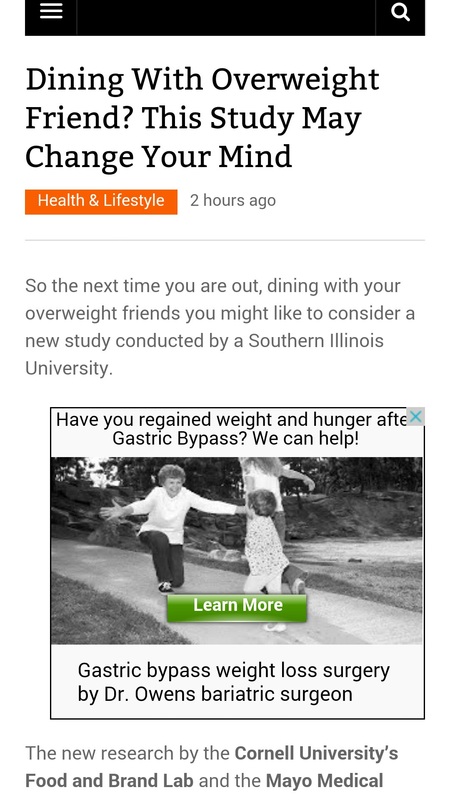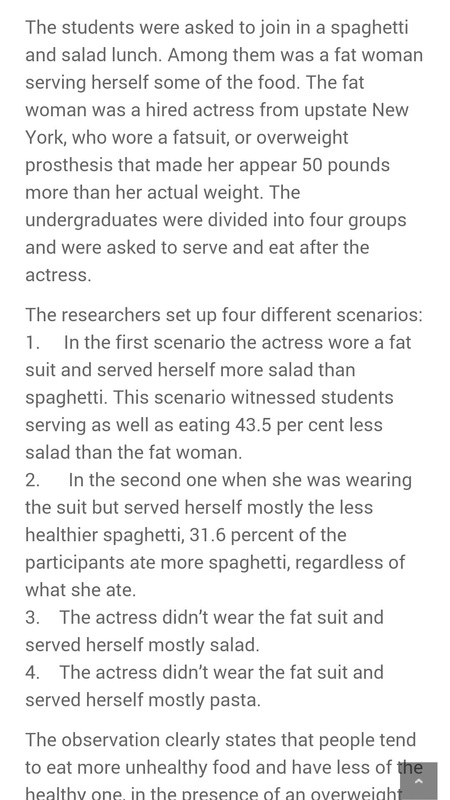|
This morning I woke up and saw this article by CapitalOTC entitled, "Dining with Overweight Friend? This Study May Change Your Mind." The article discusses the finding of a study done by Cornell and the Mayo Clinic with 82 participants in which they monitored their food choices in the presence of a hired actress in a fat suit. My concerns are with the incendiary and bigoted verbiage and image the article used, but also the study itself. I, and other fat studies scholars and activists, have spoken at length about the way that the public health language and campaigns around weight loss carry an implicit language that fat people are meant to be essentially socially quarantined because our fatness - and the habits we are undoubtedly presumed to have - can be passed onto others -like the flu. The article details some of the study's methodology: "The researchers set up four different scenarios: 1. In the first scenario the actress wore a fat suit and served herself more salad than spaghetti. This scenario witnessed students serving as well as eating 43.5 per cent less salad than the fat woman. 2. In the second one when she was wearing the suit but served herself mostly the less healthier spaghetti, 31.6 percent of the participants ate more spaghetti, regardless of what she ate. 3. The actress didn’t wear the fat suit and served herself mostly salad. 4. The actress didn’t wear the fat suit and served herself mostly pasta." From the findings: "The observation clearly states that people tend to eat more unhealthy food and have less of the healthy one, in the presence of an overweight person regardless of what they have in their plate." I am honestly having a difficult time understanding how a study with this methodology could have been approved by the Institutional Review Board, the deciding body at any research institution that determines whether studies that involve human subjects are potentially damaging or unethical.
I think that this study clearly crosses the line. I honestly was nearly sure that this was a joke as I read the article because it reads like some kind of comedy sketch. The use of a fat suit is dehumanizing and feels like an utterly unecessary element in an otherwise thoroughly bigoted study. As you've read, the conclusions of this study (and the title of this article) posit that regardless of what a fat person - a fat woman - eats, just being in proximity to one leads to what are deemed as "bad" food choices. The article further de-genders this finding, using the words "overweight friend" when the study seems to have only tested this behavior with a woman in and out of a fat suit. Why this is important? We live in a fatphobia-saturated era characterized by open fat hatred and hostility. We also live in a culture that values the scientific and the empirical. This study, I believe, seeks to legitimize and codify the ostracization of fat people - and fat women particularly. This is not only fatphobic, but also sexist. Social isolation can have affects on mental health that fat women are perhaps already experiencing due to preexisting fat shaming attitudes. Read about The Fat Suit Study on the Cornell page. 10/5/2014 11:22:35 am
The Cornell site commentary on the article concludes, "These findings demonstrate that people may serve and eat larger portions of unhealthy foods and smaller portions of healthy foods when eating with an overweight person because they are less in tune with their own health goals." Um, no. This study says nothing about the "why" and it seems pretty obvious that the presence of a higher-weight person is not the important variable here but rather the weight bias of the participants. If you change your eating based on the size of your companions, it means there is some kind of meaning you give to body size that is powerful enough to influence your behaviors. This is actually a classic demonstration of weight stigma in action, among the participants as well as the researchers and everyone else down the line that has rubber-stamped this study and its findings. UGH.
Amanda
10/23/2014 05:01:07 am
Thank you for sharing this. This is a very unscientific study. They have a lot of variables they have yet to control for - they have not replicated their findings - and it also hinges of the unfounded assumption that weight necessarily means "unhealthy." Selling this as "diet advice" is unethical and unprofessional. Frankly, exposing this behavior ought to make them a laughing stock in the research community! (Also, I sent them a nasty email!) The world does NOT need more sensational, unscientific diet advice! XO
WilliamButthurtYeats
12/20/2014 06:41:55 pm
Sorry, I know this is an old post, but I feel the need to comment.
Virgie Tovar
12/21/2014 12:34:44 am
That is feasible but not compelling, butthurt. Considering how flawed the methodology is generally this seems like a strange place to have done due diligence. (1) They're generalizing the findings to all people when they only used one single actor who is a woman. (2) the fat suit causes harm and IRBs are in place to ensure that research causes no harm. A fat suit is a caricature of a fat person = bigotry = harm. Comments are closed.
|
Virgie Tovar
Virgie Tovar, MA is one of the nation's leading experts and lecturers on fat discrimination and body image. She is the founder of Babecamp (a 4 week online course focused on helping people break up with diet culture) and the editor of Hot & Heavy: Fierce Fat Girls on Life, Love and Fashion (Seal Press, 2012). She writes about the intersections of size, identity, sexuality and politics. See more updates on Facebook. Archives
April 2021
Categories
All
|






 RSS Feed
RSS Feed